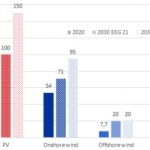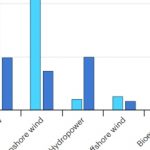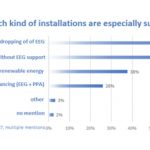Green hydrogen must be made from green electricity. But the electricity used for making it must fulfil stricter requirements than conventional green electricity. Matthis Brinkhaus at Energy Brainpool describes the criteria by which hydrogen can be designated as 100% renewable: Additionality; Additionality Plus; Temporal correlation, simultaneity; Geographical correlation, regionality. Brinkhaus points at where exceptions can be made, and where … [Read more...]
Scaling up global grid-scale Storage to 80GW/year (it was 16GW in 2022)
Globally, annual additions of grid-scale battery storage must rise to 80GW between now and 2030, explain Amit Jain, Gabriela Elizondo Azuela and Aakarshan Vaid at the World Bank, writing for WEF. In 2022 it was only 16GW. The biggest gap, perhaps understandably, is in developing countries. It’s in these regions where renewables auctions for deployment – primarily solar and wind – need to start including hybrid storage as part of the package. The … [Read more...]
Draft EU rules on Battery lifecycle decarbonisation: close the loopholes!
Draft rules mean battery manufacturers selling into Europe will have to report the product’s entire carbon footprint, from mining to production to recycling, as early as July 2024. That data will then be used to set a maximum CO2 limit for batteries to apply from the end of 2027. This is a big step forward, says T&E, addressing concerns over battery carbon footprint and recycling, and it also covers environment and human rights. But T&E … [Read more...]
Corporations, Cities, Financial Institutions: can private collective action plug the global emissions gap?
Non-state actors - corporations, cities, and financial institutions – are making their own impact on emissions reductions. We don’t just have to rely on governments, explain James Newcomb, Jun Ukita Shepard and Laurens Speelman at RMI. Case studies of harnessing private collective action already exist, and they are significant. Take Power Purchase Agreements (PPAs). In the U.S., corporates ramped up annual renewables procurements from 0.1 GW to … [Read more...]
CBAM needs universal adoption of methods for measuring carbon intensity
Europe needs to account for the emissions of imported goods. That cannot happen without the international agreement on standards and certification systems for the carbon intensity of all steps in the value chain for all relevant products. Dolf Gielen and Francisco Boshell at IRENA and Massamba Thioye at the UNFCCC explain that several such systems exist around the world, but they need to be harmonised and widely adopted to truly reflect what is … [Read more...]
Do government renewable energy auctions squeeze the PPA market?
Spanish government renewable energy auctions in January produced record-breaking low strike prices for both wind and solar. For solar the average price was €24.47/MWh (the lowest was €14.98/MWh), guaranteed for 12 years through contracts-for-difference (CfDs). As such auctions continue around Europe, Michael Claußner at Energy Brainpool asks what impact these prices will have on future power prices in general and on solar power purchase agreement … [Read more...]
Germany’s Renewable Energy Act 2021: how to implement the fine policy detail of emissions reduction targets
After much haggling and debate, Germany’s Renewable Energy Act (EEG) 2021 was finally approved in December and came into force on 1 January 2021. Sila Akat and Simon Göss at Energy Brainpool outline the most important changes imposed by the amendment. It gives an insight into how a nation is dealing with the finer details of increasingly ambitious emissions reduction targets. The authors cover the main issues and outcomes. How Germany is dealing … [Read more...]
2019-2024: competitive auctions will launch over 2/3rds of utility-scale renewables, says IEA
Government support for new utility-scale capacity is being replaced with competitive auctions, the surest sign that the commercial appetite for renewables - particularly solar PV and onshore wind - is growing strong. This article by the IEA pulls out the essential numbers from their annual Renewables 2019 report (their 5-year market analysis and forecast for renewable energy and technologies in the electricity, heat and transport sectors). The … [Read more...]
Germany 2021: when fixed feed-in tariffs end, how will renewables fare?
Starting in 2021 many of Germany’s existing “pioneer” wind turbines, solar PV installations and biogas plants – launched with generous price guarantees - will stop receiving fixed feed-in tariffs. That means renewable capacity may be shut down if they can’t find a new business model to run on. The new rules comes at a decisive time for Germany’s energy transition as it tries to increase renewables to meet emissions targets and gradually increase … [Read more...]










